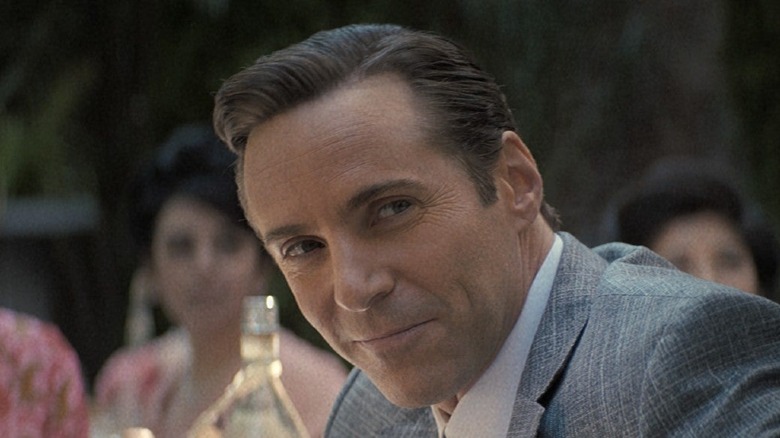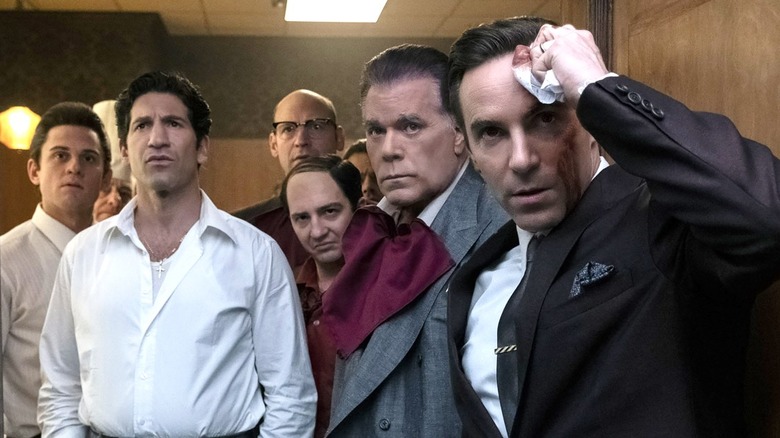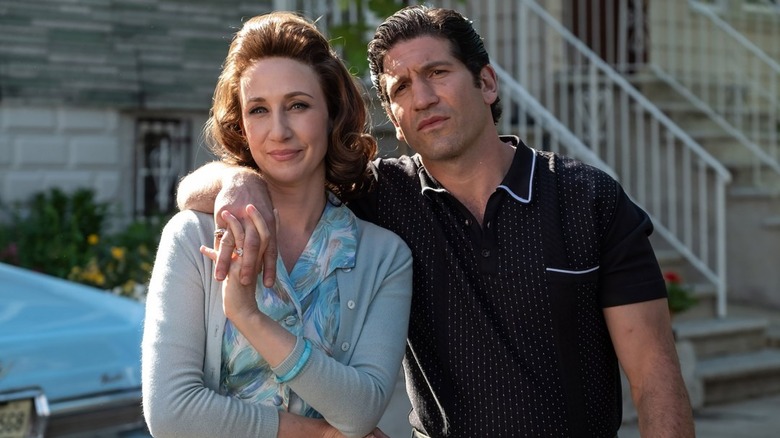The Many Saints Of Newark Review: Gangster's Paradise Lost
It's been nearly 15 years since David Chase wrote his infamous ending for "The Sopranos," the HBO crime drama which has gone down in history as one of the greatest and most influential TV series not just of its era, but of all time. The weight of that prestige was always going to loom large over whatever Chase decided to do next, whether it was character-driven dramas like his film "Not Fade Away" or any potential related "Sopranos" media. So when it was announced that Chase would finally follow up the series with the long-awaited prequel film "The Many Saints of Newark," "Sopranos" fans immediately leapt into a dual state of excitement and anxiety. What if, after all this time, Chase had lost the magic that made the original series so special?
This curious blend of anticipation and waiting for the other shoe to drop feels reflected in the marketing surrounding the film, and Chase's own admitted unease with it all. Warner Bros. has been keen to market the film as a Tony Soprano-driven prequel, playing up the casting of the late James Gandolfini's son Michael as a dead ringer for young Tony, and even adding the subtitle "A Sopranos Story" to "Many Saints" in an effort to remind more casual fans that they were getting more of Chase's darkly comic, slyly philosophical version of New Jersey's mafia world. In an interview with Rolling Stone, Chase acknowledged young Tony's part in the story, but was also quick to note that this was "about gangsters in the late '60s, early '70s in New Jersey," and "not set up as a Tony Soprano origin story."
If you've followed all of this, it adds up to a feeling that's not quite confusion, but not quite confidence either, and sadly it's a feeling that "The Many Saints of Newark" itself emulates throughout its runtime. For all the swagger and cleverness within the film, and all the new ideas Chase is hoping to inject into his version of gangster cinema, the film can't escape the beloved series it emerged from, nor can it emulate it enough to be a crowd-pleaser. The result is a disjointed yet stylish crime drama that's at turns frustrating and exhilarating.
A different time, a different made man
The "Many Saints" of the title refers to the English translation of "Moltisanti," and because we're jumping back more than two decades before the series began, that means Christopher Moltiasanti's (played by Michael Imperioli in the original series) fabled father Dickie (Allesandro Nivola), who died when Christopher was a boy but was, in his day, a powerful member of Jersey's DiMeo crime family. When we meet him, Dickie's father, Hollywood Dick (Ray Liotta) has just returned from Italy and brought a gorgeous new young wife (Michela De Rossi) along with him. Dick's presence back in Dickie's life, as the young Moltisanti wrestles with his own home life and his work running betting numbers for the family, isn't exactly a welcome one. To make things more difficult, Dickie's got plenty of other obstacles to deal with, including an enterprising Black gangster named Howard (Leslie Odom Jr.) who is radicalized by the Newark riots of 1967 and wants to break out of working for yet another white man.
Then there's the Soprano family, in which Dickie serves as a kind of adoptive brother to Johnny (Jon Bernthal) and Corrado "Junior" Soprano (Corey Stoll), two movers and shakers in Newark who seem poised for bigger and bigger leadership roles in the DiMeo outfit. Because Johnny's always in and out of prison, and Junior's not exactly the fatherly type, it falls to Dickie to play mentor to Johnny's son Tony (Michael Gandolfini), often at the behest of the boy's emotional mother, Livia (Vera Farmiga). Between the Sopranos, the DiMeo outfit, and his own wife and son at home, Dickie's splitting his time between three families, and that's not even counting the way he starts to look at his father's new wife. Sooner or later, something has to give.
It's this tension between Dickie's various responsibilities, and his own desire to at least attempt to be a good person amid all the crime and murder, that propels Chase and co-writer Lawrence Konner's script, and when it's working, it works very well. The same pressures that drove an older Tony Soprano in the series — that feeling of sitting constantly in a push-pull between the opposing ideas of goodness and self-imposed sin — often drive Dickie as he moves through the various sub-worlds of his life, trying to set an example, trying to honor his adoptive family, trying to prove that he's worthy of the opportunities he's been given, and trying to indulge his own pleasures all at the same time. Yet for all Chase's efforts to make a different kind of gangster film, it's hard not to see the echoes of what's come before, even if what's come before takes place in the future. Dickie's arc starts to feel like an imitation of Tony's, and abbreviated one at that, one that's further complicated by the film's efforts to juggle several storylines over the course of two hours.
Prequel problems
Running alongside Dickie's journey is, of course, the expected "Sopranos" tie-ins and prequelizing, whether that's younger versions of Silvio (John Magaro) and Paulie Walnuts (Billy Magnussen) or Farmiga's uncanny ability to sound like a future Carmela Soprano, setting Tony's mommy issues in stone decades before he steps into Dr. Melfi's office. If you're a fan of the show, it's both amusing and a little exasperating to see so many knowing winks and clever flourishes thrown in to tie the film into the larger narrative. When it's working, as in the case of Farmiga and Michael Gandolfini playing off each other, it works very well. When it's not, it's usually because the film is trying to jam too much into a small space.
Because, if nothing else, "The Many Saints of Newark" is indeed an absolutely jam-packed film. It's got "Sopranos" continuity nods, it's got one gangster's doomed journey toward his own sense of fulfillment or lack thereof, it's got jokes, it's got riots, it's got people doing impressions, and through it all the most impressive thing about the film is all the acting that actually does cut through the noise. Though his arc ends up rather formulaic, Nivola is impressive and commanding as Dickie Moltisanti, adding a swagger to the film that might have otherwise been lost. Farmiga steals every single scene that she's in, and does the late Nancy Marchand proud. Michael Gandolfini disappears into young Tony to the point that, if you're like me and deeply loved his father's work, even his funny scenes become an emotional journey. No one in the cast is bad, but aside from the standouts, everyone else feels like they're either working in caricature or simply getting lost amid everything else that's going on.
"The Many Saints of Newark" will certainly find its share of fans among people who just can't get enough of David Chase's gangster world, and his ability to weave back through the continuity of the series remains impressive even this far removed from the "Sopranos" finale. But in the end, this is a film that plays like two or three movies compressed into one frustrating two-hour block. It might have worked better as a miniseries, or even a novel. As it is, it's a jarring and messy work that's all the more frustrating because of the clear, bright flashes of greatness tucked inside of it.
"The Many Saints of Newark" is now in theaters and streaming on HBO Max.


